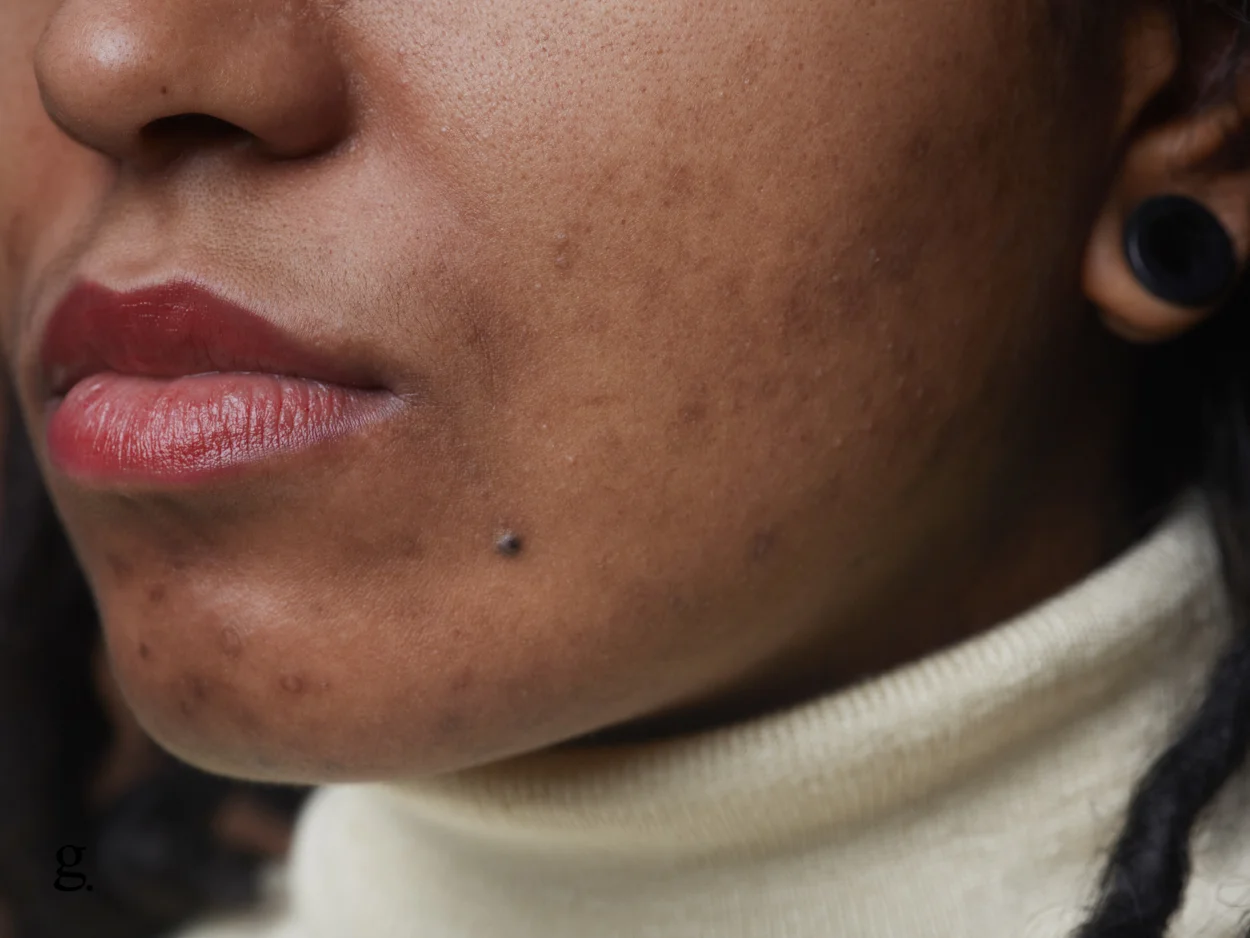Ah, acne-prone skin. It’s a struggle that many people face, and it can feel like a never-ending battle. But fear not, because this guide has your back! It’s time to dive deep into the world of acne and learn all the tips and tricks for treating acne-prone skin.
No more second-guessing skincare routines or wasting money on products that don’t work. Get ready to discover the secrets to a clear, glowing complexion and say goodbye to those pesky pimples for good. Let’s get started, shall we?
Acne-prone skin & the causes behind it
Acne-prone skin can be a real pain, but understanding the causes behind it can help you address the issue more effectively. Here are some common factors that contribute to acne-prone skin:
- Excess sebum production: Sebum is an oily substance produced by your skin’s sebaceous glands to keep it moisturized. However, when your skin produces too much sebum, it can clog pores, leading to acne.
- Dead skin cell buildup: Your skin is constantly shedding dead cells, but sometimes they don’t slough off as they should. When these cells accumulate, they can clog pores and create a breeding ground for acne-causing bacteria.
- Bacteria: Propionibacterium acnes (P. acnes) is a type of bacteria that naturally lives on your skin. However, when it gets trapped inside a clogged pore, it can multiply and cause inflammation, resulting in acne.
- Hormones: Hormonal fluctuations, especially during puberty, pregnancy, or menstruation, can increase sebum production and lead to acne breakouts.
- Genetics: If your parents had acne-prone skin, there’s a chance you might be more susceptible to it as well.
- Diet: While the connection between diet and acne is still debated, some studies suggest that consuming high-glycemic foods or dairy products might contribute to breakouts.
- Stress: High-stress levels can cause your body to produce more cortisol, a hormone that can increase sebum production and lead to acne.
- Irritating skincare products: Using harsh or comedogenic (pore-clogging) products can exacerbate acne-prone skin.
The Different Types of Acne Explained
Knowing the enemy is half the battle, right? So, let’s break it down:
Whiteheads
These are small, closed comedones (clogged pores) that appear as tiny white bumps on the skin. They form when dead skin cells, oil, and bacteria get trapped inside a pore.
Blackheads
Similar to whiteheads, blackheads are open comedones. The difference is that the pore remains open, exposing the trapped material to air, which causes it to oxidize and turn black.
Papules
These are small, raised, red bumps on the skin caused by inflammation. They’re usually tender to the touch and occur when oil and bacteria build up inside a pore, leading to a mild infection.
Pustules
Pustules are similar to papules but contain pus. These pus-filled bumps have a white or yellow center and are surrounded by a red, inflamed base.
Nodules
These are large, hard, and painful lumps that form deep within the skin. Nodules develop when a clogged pore becomes severely inflamed, leading to a more severe infection.
Cysts
Cystic acne is the most severe type and forms when a pore becomes clogged, causing a deep, painful, pus-filled lesion. This type of acne can lead to scarring if not treated properly.
Caring For Acne-Prone Skin
Acne is a common skin condition that can cause a lot of frustration. If you have acne-prone skin, you may feel like you’ve tried everything to get your breakouts under control. Fortunately, this skincare routine can help keep acne at bay.
Daily cleansing
Daily cleansing is a crucial step for anyone with acne-prone skin. Proper cleansing helps to remove excess oil, dirt, and bacteria from the skin’s surface, reducing the risk of clogged pores and breakouts. Here are some tips for effective daily cleansing:
- Choose a gentle, non-comedogenic cleanser: Look for a cleanser that’s specifically designed for acne-prone skin and labeled as non-comedogenic. These cleansers are formulated to be gentle on the skin while effectively removing impurities. Avoid using harsh, abrasive scrubs or soaps, as they can irritate the skin and make acne worse.
- Wash your face twice a day: Cleansing your face twice a day is the optimal amount to maintain a healthy and clear complexion. Over-cleansing can strip the skin of its natural oils, which can lead to dryness, irritation, and more breakouts.
- Use lukewarm water: Hot water can irritate and dry out your skin, leading to increased oil production and more breakouts. Lukewarm water is best for cleansing, as it’s gentle on the skin and won’t strip away its natural oils.
- Gently massage the cleanser into your skin: Use gentle circular motions to massage the cleanser into your skin. This helps to remove dirt and oil from the surface of the skin, while also promoting circulation and healthy skin.
- Rinse thoroughly: Make sure to rinse your face thoroughly with lukewarm water to remove all traces of the cleanser. Any leftover product can clog pores and cause breakouts.
- Pat your face dry: After cleansing, be sure to pat your face dry with a clean towel. Avoid rubbing your face, as this can cause irritation and inflammation.
Regular exfoliation
Exfoliation is an important step in any skincare routine, but it’s especially crucial for those with acne-prone skin. Exfoliation helps to remove dead skin cells, excess oil, and other impurities that can clog pores and contribute to breakouts. Here are some tips for effective exfoliation:
- Choose a gentle exfoliant: When it comes to exfoliating acne-prone skin, it’s important to choose a gentle product that won’t irritate or damage the skin. Chemical exfoliants, like alpha-hydroxy acids (AHAs) or beta-hydroxy acids (BHAs), are a great option for acne-prone skin. These exfoliants work by dissolving dead skin cells without the need for physical scrubbing, which can be irritating to the skin.
- Exfoliate no more than twice a week: While it’s tempting to exfoliate every day, doing so can make breakouts worse. Over-exfoliation can strip the skin of its natural oils, leading to dryness and irritation, which can in turn lead to more breakouts. Instead, exfoliate no more than twice a week to maintain healthy and clear skin.
- Avoid physical scrubs: Physical scrubs can be too abrasive for acne-prone skin, causing irritation and inflammation. Instead, opt for chemical exfoliants, which are gentler on the skin and more effective at removing dead skin cells.
Staying moisturized
Moisturizing is an essential step in any skincare routine, regardless of skin type. For those with acne-prone skin, finding the right moisturizer is crucial to maintaining a healthy and clear complexion. When looking for a moisturizer, it’s important to choose a lightweight, non-comedogenic product that won’t clog pores. These types of moisturizers are formulated to be gentle on acne-prone skin and won’t exacerbate breakouts.
When choosing a moisturizer, look for hydrating ingredients like hyaluronic acid or glycerin, which help to draw moisture into the skin and keep it hydrated. Avoid heavy, oil-based moisturizers, as they can contribute to excess oil production and clogged pores. It’s best to apply moisturizer to your face and neck after cleansing, as this will help to seal in moisture and prevent dryness, which can lead to irritation and more breakouts.
While it’s important to keep your skin hydrated, it’s also crucial not to over-moisturize, as this can make breakouts worse. Apply a thin layer of moisturizer and allow it to absorb fully before applying makeup or other products. If you’re looking for a quick and easy way to hydrate your skin throughout the day, consider using a facial mist.
Staying protected from UV
Protecting your skin from the sun’s harmful rays is crucial for preventing sun damage, particularly if you have acne-prone skin. When choosing a sunscreen for acne-prone skin, it’s essential to opt for a product that won’t clog your pores. While mineral-based sunscreens are an excellent choice for many, they can feel heavy and sit on top of the skin, which can exacerbate breakouts. Instead, you may want to consider using a chemical sunscreen, which is lighter and less likely to clog your pores.
Chemical sunscreens work by absorbing UV rays, rather than reflecting them like mineral-based sunscreens. This means they’re less likely to sit on top of the skin and feel heavy or greasy. When applying sunscreen, it’s important to apply it generously to all exposed areas of skin, and reapply every two hours or immediately after swimming or sweating.
Use makeup that’s specifically designed for acne-prone skin
Makeup that’s specifically designed for acne-prone skin can help to minimize breakouts and keep your skin looking healthy and clear. When choosing makeup, it’s important to look for products that are labeled as non-comedogenic and oil-free. These products are formulated to be gentle on acne-prone skin and won’t clog pores, reducing the risk of breakouts.
Always shop non-comedogenic
When you have acne-prone skin, choosing the right skincare and makeup products can make all the difference. One key factor to keep in mind when shopping for these products is the term “non-comedogenic.” This term refers to products that are formulated to avoid clogging pores, reducing the risk of breakouts.
Non-comedogenic products typically contain ingredients that are less likely to clog pores, such as lightweight oils or water-based formulas. These products are also designed to be gentle and non-irritating to the skin. This is important because acne-prone skin is often sensitive and easily irritated, which can lead to further breakouts.
When shopping for non-comedogenic products, look for brands that specifically advertise their products as such. This ensures that you’re choosing products that are designed with acne-prone skin in mind. Some common types of non-comedogenic products include oil-free moisturizers, lightweight serums, and gentle cleansers.
Have A Healthy Diet
Having healthy lifestyle habits can significantly benefit acne-prone skin. It’s important to drink plenty of water to stay hydrated, as dehydration can cause your skin to produce excess oil, leading to more breakouts.
A balanced diet rich in fruits and vegetables can also help to nourish your skin from the inside out. Eating foods that are high in antioxidants, like blueberries and leafy greens, can help to reduce inflammation and improve skin health.
Never pick or pop your pimples
One of the most important things to remember when dealing with acne-prone skin is to never pick or pop your pimples. While it may be tempting to do so, it can lead to scarring and further breakouts. Instead, use topical treatments like spot treatments or acne patches to help heal your blemishes.
Avoid touching your face
Another important tip is to avoid touching your face. Your hands carry bacteria, and touching your face can transfer that bacteria to your skin, leading to breakouts. If you must touch your face, be sure to wash your hands thoroughly first.
Conclusion
Acne-prone skin can be frustrating to deal with, but with the right skincare routine, it’s possible to achieve a clear and healthy complexion. Understanding the causes and types of acne can help you choose the best products and treatments for your skin, while daily cleansing, regular exfoliation, and staying moisturized can help prevent breakouts.
Choosing non-comedogenic products, using sunscreen, and avoiding touching your face can also help keep your skin clear.
By following these tips and using the right skincare products, you can say goodbye to pesky pimples and achieve the clear, glowing skin you’ve always wanted.

